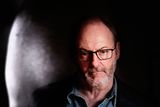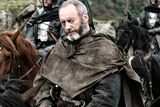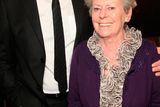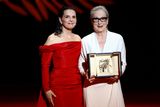Liam Cunningham on his phenomenal success in 'Game of Thrones', his childhood in Coolock and getting married at 22
Liam Cunningham talks to Barry Egan about ‘Game Of Thrones’, being a punk at 18, getting married at 22, why he didn’t move to LA and his recent trip to South Sudan



Actor Liam Cunningham could read the phone directory and make it appear like he was unlocking some secret code from The Old Testament. His voice — which makes him sound like an existential Charlton Heston in Ben Hur channelling a Northside Leonard Cohen — has a power all of its own...
That power is deepened when you consider he has been smuggler-turned-wise-knight-himself — Davos Seaworth — in Game Of Thrones since 2012.
Sitting in a bar in Dublin, Liam says his best memory of working on the show has yet to come — in the final series of the epic fantasy which airs in April: “Richard Plepler, the head of HBO, said he watched the six episodes twice and that, basically, you are looking at six movies, six Game Of Thrones movies.”
Asked about his plans post-Game Of Thrones, he says: “Continuing working, continuing to put shoes on my own children’s feet. I’ve got a couple of bits and pieces planning. I’ve just come back from South Africa where I’ve been doing a drama [The Hot Zone] about the Ebola crisis with the lovely Julianna Margulies.”
In 'Game of Thrones'
Did Liam ever wonder during his seven series on the blood-soaked show how he stayed alive, given that in the first series lead character Ned Stark (played by Sean Bean) got his head chopped off?
“I know!” he hoots. “You couldn’t make any plans on this! You go with the story; and if they decide to dispense with you, you were gone.”
What kind of man is Davos Seaworth?
“He is decent man. He is a man from lowly beginnings who has ended up in a nest of vipers. He has been described as the moral compass of Game Of Thrones, which I suppose he is, and you do need that, with all the moral ambiguity.”
And what kind of man is Liam Cunningham?
“He is never going to be Davos Seaworth! If you are putting a rope around my neck, I’ll squeal like a little girl! I think he’d just take it on the chin.”
Liam with his mother Kathleen
Self-deprecation aside, you don’t doubt that it was his own moral compass that recently took Liam Cunningham to South Sudan in Africa with the charity World Vision, to raise awareness for the poor souls forced to flee their homes because of the civil war. While in South Sudan, Liam photographed some of the people he met in the camps.
“Going to South Sudan was a major eye opener,” he says. “For people that don’t know it is the youngest country on the planet. So we kind of have a bit of responsibility to see that it is not wrecked.
“If the fighting doesn’t stop and these people can’t feed their families, it is not that far to hit the Med. I talked to the head of the World Food Programme over there when I went. I said to him, is it beyond the realms of imagination that they could head north? And he said no, it wasn’t beyond the realms of imagination.
“George Soros [Hungarian-American investor and philanthropist] said recently said that a Marshall Plan [which helped rebuild Western European economies after World War II] is needed. I know he is ‘Marmite’ for some people, George Soros, but he is very interesting on all sorts of stuff. I like the cut of his jib to be honest. He said you need about €20bn. Which is not a great deal of money in this day and age for a Marshall Plan for that area, to get it up and running again, because it is an incredibly fertile place. They could easily feed themselves.
“This is not the goodie two shoes coming out in me. It is in our interests to do as well as the humanitarian interest. I try to talk about it because I want to make people aware of the cataclysmic possibilities that could happen if we don’t get together and do something — it is very possible it will,” Liam continues with a characteristically gritty passion.
He talks about meeting a young boy in a camp in Juba, the capital of South Sudan. He was 15 years old when the soldiers came to his village “and f**king murdered his dad in front of him. Bad enough that; then they took him in, they conscripted him. He will tell you himself, they took him to villages that they burned down and they raped the women and the whole lot. Horror stuff. Obviously he didn’t want to do it. The United Nations airlifted him out eventually. I met him in a refugee camp. He was sitting in 50 degree heat in a plastic UNHCR tent with his school books in front of him. He is a delightful kid, really soft spoken. By himself, he is trying to teach himself with the books. I just went, ‘This is f**cking ridiculous’.
“I try to avoid finding out which side they [the soldiers] were on; everybody’s in f**cking shit,” adds Liam. “You’ll hear some story of one side and it will taint your sympathies and I don’t want to do that. Everybody is a victim in a war. Don’t be under any illusion. War is about cruelty.”
It is like Marlon Brando’s Colonel Kurtz’s speech in Apocalypse Now. “That was my audition for acting school,” says Liam. “Brando’s speech. Naivety is a wonderful thing. I had it on a VHS tape at the time. I wrote it down on a piece of paper and learned it off. You have to laugh.”
The film was inspired by Joseph Conrad’s Heart Of Darkness, set in Africa. “That’s why Brando reads T. S. Eliot’s The Hollow Men,” says Liam, “which was based on Conrad’s novel. Part of the byline with The Hollow Men is: ‘Mistah Kurtz — he dead’. That’s why Brando reads it out. He is reading a poem about himself in the movie, just before Martin Sheen comes in and slaughters him.”
Was there some sort of subconscious draw to Africa for Liam?
“I used to live in Africa, in the 1980s,” he says — he lived in Zimbabwe for three and a half years when he took leave from his job at the ESB to work for the Electricity Supply Commission in Africa on contract.
“I was 22. I had never been on a plane before. I was a kid. I had never been anywhere. I had never been on a plane. I had been to Scotland. That’s as far as I got. On a motorbike. I was 19. So,” he laughs, “my first time on a plane was going to live in Africa. That’s why I’m an actor. Africa. That’s why. That’s why I have my wife of 34 years,” he says of Colette whom he met when he was 19. “I married her because I couldn’t take her out as my girlfriend.“
I ask why not.
“They wouldn’t give her a visa. So I’m with her, and I’m madly in love, and I was between a rock and a hard place. I had to go because I had never been anywhere. I didn’t want to go without her. So the only way I could bring her was married. So it was either stay and be pissed off or go and be pissed off. Or bring her with me.”
The journey in 1984 to Africa was an “absolutely ridiculous culture shock” starting at Gatwick Airport.
“I got on the Air Zimbabwe flight and I remember being hit by a wall of curry, the smell of curry, because there was a big Indian population and they had all eaten before they got on the plane. This was the first visceral cultural shock I got. I immediately got frightened of the smell.”
Why?
“Because I had never smelled a curry in me life!” laughs Liam who had “left me ma, emigrated and got married in the space of three weeks in 1984.”
Getting married at 22 is a cultural shock in itself.
“I know. F**king mad. What!” he laughs. “I figured that we were going on this mad adventure. If we can go three years with just the pair of us! Look on it as a three-year honeymoon! And we are still there. I am 35 years married this month, by the way,” Liam says.
In 1988, Liam was back a month from Africa, driving “around in me little yellow van in Dublin”, when he thought: “I just can’t f**king do this any more.”
This epiphany-in-a-van was magnified by the fact that the last place Liam worked before he returned was the national park. “It was the size of Belgium, 16,000 elephants. And I go back to driving a little yellow van around Drimnagh and Walkinstown. It just doesn’t have the same glamour any more.”
Why did he come back?
“Zimbabwe started to feel like home. And I didn’t want two homes. I thought if I stay here any longer and then go home I’ll miss Zimbabwe; and if I don’t go home I’ll have home in my head. So I decided to get out of Zimbabwe that much [he indicates with his fingers] before it became my home.”
Did Liam have kids over there?
“No.”
What age was Liam when he had kids?
“Nine years married. I just didn’t bother. I was having a great time.” He was also thinking that he wanted to be an actor at some level.
Did Liam have a conversation with his wife where he told her he couldn’t go back to being an electrician and he wanted to be an actor?
“She was great, She was cool like that. She didn’t envisage it becoming a career,” says Liam, who went on to starring roles in not only Game Of Thrones but The Wind That Shakes the Barley, Hunger, etc.
“I was looking to distract myself from the fact that I was bored with the job. I didn’t expect that I would fall in love with it.”
Was Liam a philosophical child growing up?
“I knew if I was unhappy I had to do something about it.”
As opposed to stay in ESB for the rest of his life?
“And tolerate it. I watched older guys as you have and seen their souls slowly ebbing away. And guys that I remember when I started my apprenticeship being full of life and bottle then they were clocking in and clocking out. I went: ‘F**k! I can’t become like that!’ I was also a punk when I was growing up. I saw the Virgin Prunes’s second ever gig at the Project in 1978. And U2 in the Dandelion and all that sort of carry on.”
How did punk Liam dress in 1978?
“I was relatively conservative. I had a few mates who were mental with the big Mohicans and all. I had a skinhead and an army coat and 12-hole Docs. I wasn’t a skinhead.”
Was he in a band?
“No. I couldn’t afford the instruments.”
A ranting poet then?
“No. There was nothing artistic that I did,” Liam laughs.
But there was a flint of the anti-establishment in his heart?
“Of course, yeah. I bumped into Paul Weller [ex-lead singer of The Jam] in the Four Seasons. And I bumped into Mick Jones of The Clash. They are one of the reasons I am doing what I do. I said that to them in 10 seconds and before they had a chance to draw breath, I ran. In 1979, me missus went over to America with her ma and she brought me back the American version of Setting Sons by The Jam. Fair play to her for getting it for me, Setting Sons,” he says quoting a line from the anti-war song Little Boy Soldiers: ‘Then they send you home in a pine overcoat/ With a letter to your mum/ Saying find enclosed one son, one medal and a note/ To say he won’.
“When I heard that I thought, ‘I ain’t f**king joining no army’. It was stuff like that made me go, I’ll shoot myself before I get my son conscripted into any army. That formulated my cantankerousness.”
Did his late father Michael, who worked on the docks, help formulate Liam’s cantankerousness too because of his background?
“I was showing someone a photograph of him. He went to the same primary school as me, St Laurence O’Toole’s in Seville Place. There is a photograph of their year and they were in their best bib and tucker. My dad is on the back tier of three. There is about 12 blokes in the front. The interesting thing was of the 12 in the front row there was only three of them wearing shoes. The rest of them are f**king barefoot. That would have been early 1940s probably. My youngest is going to be doing his Leaving coming up in June. But my other two are now in college. They are going to get degrees. For my dad, to reach being a docker and a crane driver, that was a major kind of push for a bloke who probably had no shoes up to the age of 12,” Liam says, adding that his grandfather William “worked on the docks and broke his back, fell into the hull of a ship, and was in a wheelchair. And my dad started working at 14. He worked in Wood Place around the corner from where we grew up”.
Liam’s mother Kathleen, who is 86 years old and who he cooked Christmas dinner for as well as his wife and kids, Liam Jr, Sean and Ellen, at home this year — is from “St Laurence’s Mansions in Sheriff Street. I used to go there for my lunch every day because we moved out to the dizzy heights of Coolock when I was about eight or nine. A beautiful corporation house. I don’t know whether it was social housing but it was a beautiful, McInerney-built home.”
Was it like moving to the countryside? “There were fields! There was a f**king nunnery or something and they used to grow barley. Half the houses weren’t built. Our bit was built but there was loads that wasn’t.”
I ask Liam was he happier in the city or in the countryside, as it were, of Coolock?
“When I think about it, I have never not been happy. I’m delighted. I’m blessed. We never had much money but I had a more glorious upbringing than a lot of people with huge amounts of money,” says Liam who has three sisters and a brother.
What was Liam’s family house like in North Wall? Was he sharing a bedroom?
“Ah, yeah. Me da used to say: ‘First up, best dressed.’ ‘What the f*ck does that mean, da?’ ‘It’s a pile of clothes and whoever gets up first gets the best clothes.’ ‘You f**king joking me, da!’ It was like the Four Yorkshiremen sketch [Monty Python comedy about poor beginnings].
“Me da told me that growing up they used to sleep on sheets that were made out of flour bags that were sown together. I said you are f*cking joking me da. A treat was dripping on bread. Dripping!”
What about Liam’s upbringing?
“I didn’t have a bean. I went out and tried to get some money. At 13 I went out and started working as a lounge boy in Dooley’s in Dorset Street. I think it’s called the Red Parrot now. I was 13 years old and I used to cycle from Coolock to Dorset Street.”
How far was that?
“It was a good half an hour on a bike, and then I’d have to come back at one o’clock in the morning, bollixed after being working all night. So I was able to put in a bit of graft. But it was good. We hadn’t got much money at the time. Me ma used to have to take my little envelope off me, which kind of sharpens your wits.”
Liam and his wife have lived in the same home in Killester all their married lives. They were never tempted by the bright lights of Los Angeles, even when Game Of Thrones made him an international star?
“LA is the factory. I don’t want to live in the factory. I like seasons as well.”
The Dignity photo exhibition showcasing photographs taken by Game of Thrones actor Liam Cunningham on a recent trip to South Sudan with World Vision will be located in the Powerscourt Townhouse centre from 11th Jan for three weeks .
World Vision’s humanitarian programmes in South Sudan are funded by the Irish people (via a grant from Irish Aid), so the purpose of this exhibition is to raise awareness for this work and to show the Irish public how their money is being put to use. www.worldvision.ie
Read more:
Join the Irish Independent WhatsApp channel
Stay up to date with all the latest news



















